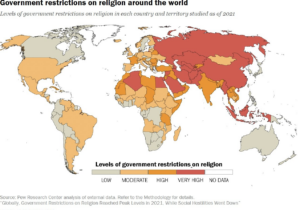Some 300 Islamic scholars, theologians, and legal experts recently gathered in Morocco and issued the Marrakesh Declaration, which condemns attacks against religious minorities in predominantly Muslim countries. “These minorities have been victims of murder, enslavement, forced exile, intimidation, starvation and other affronts to their basic human dignity,” the scholars declared. “Such heinous actions have absolutely no relation whatsoever to the noble religion of Islam, regardless of the claims of the perpetrators who have used Islam’s name to justify their actions: any such aggression is a slander against God and His Messenger of Mercy as well as a betrayal of the faith of over one billion Muslims.”
The Marrakesh Declaration is a good—albeit late—start. Political and religious leaders in the Middle East’s Muslim-majority nations have much ground to cover to protect religious minorities. Shiites are targeted in Sunni-majority nations, Sunnis in Shiite-majority nations, and Christians virtually everywhere in the Middle East.
Between Christ’s birth and 1914, Christianity grew from a tiny, offshoot sect of Judaism into a sizeable 30 percent of the Middle East’s population. Today, Christians account for just 3 percent of the region’s population.
The persecution is widespread and worsening—and is leading to what Reza Aslan of the Council on Foreign Relations calls “a regional religious cleansing.” His word choice purposely evokes the “ethnic cleansing” that occurred in places like Bosnia, Croatia, Kosovo, and Rwanda in the 1990s. Put another way, this persecution of Christians is intended to expunge Christians from the birthplace of their faith.
Genesis tells us that Adam and Eve’s garden paradise was somewhere between the Euphrates and the Tigris—the heart of modern-day Iraq. Abraham migrated from Ur, also in today’s Iraq. Moses wandered the Sinai, in Egypt. The Promised Land he searched for is modern-day Israel. Esther was queen of Persia, known today as Iran. Jesus was born in Bethlehem (now administered by the Palestinian National Authority), moved to Egypt, lived all across modern-day Israel, and traveled to Tyre (in Lebanon) and Gadara (in Jordan). Paul met the risen Lord on the road to Damascus (the capital of modern-day Syria).
But the bitter irony is that the Holy Land of 2016 is being emptied of Christians.
Iranian Christians, for example, are literally scourged for drinking communion wine—80 lashes is the common punishment. The regime in Iran is in the midst of a multi-year crackdown on Christians in what the U.S. Commission on International Religious Freedom (USCIRF) describes as “ongoing and egregious violations of religious freedom, including prolonged detention, torture and executions.” Iranian authorities “raid church services, harass and threaten church members, and arrest, convict and imprison worshippers and church leaders,” according to USCIRF’s annual report. “Christians, particularly Evangelical and other Protestants, are subject to harassment, arrests, close surveillance and imprisonment.”
The situation is worse in neighboring Iraq. In the territories it has seized from the Iraqi and Syrian governments, ISIS has subjected Christian (and Yazidi) women to mass-rape and sex slavery; orchestrated mass-beheadings of Egyptian Christians; razed ancient Christian churches; and targeted Assyrian Christians for abduction. Half of Iraq’s Christian population has fled in the past 10 years—and understandably so given waves of anti-Christian violence and anti-Christian government policies. Iraqi Christians can convert to Islam, pay a special tax for non-Muslims or risk death.
A Baptist church in Bethlehem is being targeted by the nascent Palestinian government in the courts. Christians once comprised 80 percent of Bethlehem’s population; today, they represent 20 percent. (Tellingly, the vicar of Iraq’s Anglican congregation calls Israel “the only place in the Middle East Christians are really safe.”)
As Syria’s brutal civil war grinds on, some Christians within and outside Syria are pulling for Bashar Assad, given that among the forces arrayed against him are ISIS and other jihadist groups that vow to expunge non-Muslims from the region. But this enemy-of-my-enemy approach is very much like making a deal with the devil. Despite the propaganda spread by the handful of pro-Assad Christians, Assad’s Syria is a cellar dweller when it comes to religious liberty. Indeed, if the Assad dynasty is truly a friend of Christians, one is left to wonder why Christians accounted for 30 percent of Syria’s population 80 years ago but only 10 percent today. The Assads have been in control of Syria for almost 50 years.
In Egypt, 42 churches were attacked after the coup that toppled Mohamed Morsi in 2013. According to USCIRF, Egypt’s Christians face “official and societal discrimination.” At least 100,000 Christians fled Egypt in 2011 alone.
This is a snapshot of what Aslan poignantly and aptly calls “the Christian exodus.” It’s apt not only because Christians are fleeing the Holy Land, but also because this exodus and the first are rooted in religious liberty. We sometimes forget that Moses’ interaction with Pharaoh was primarily about religious freedom. Speaking through Moses, God declared, “Let my people go so that they may hold a festival to me in the desert” (Exodus 5).
Religious liberty is the proverbial canary in the coalmine of a society’s health and character. It doesn’t tell us everything about a government or a nation, but it tells us enough.
Religious liberty also can be an indicator of a society’s threat to the security and interests of others. “Including World War II, every major war the United States has fought over the past 70 years has been against an enemy that also severely violated religious freedom,” University of Texas professor William Inboden observes. “Such was the case with Nazi Germany, North Korea, North Vietnam and Saddam Hussein’s Iraq. This characterized other conflicts as well. The Cold War standoff with Soviet communism featured an opponent that engaged in systemic religious persecution. Numerous smaller-scale military interventions, such as Lebanon in 1983, Libya in 1986 and 2011, Somalia in 1993, Bosnia in 1995, and Kosovo in 1999, were also targeted against actors that embraced religious intolerance.” We could add to that list Afghanistan under the Taliban—a brutal, backward regime that made common cause with al Qaeda and crushed any deviation from their poisoned perversion of Islam—and ISIS.
This is not to suggest that we should press our government to go to war against Christianity’s persecutors. However, we should challenge policymakers to shine a light on these enemies of freedom. Although the White House issued a statement in 2014 affirming “the commitment of the United States to work for the protection of Christians and other people of faith in Egypt and around the world,” the world needs to hear more from the White House—and more often—about the persecution of Christians in the Holy Land.
For inspiration, Washington should look to London. Prince Charles has spoken passionately on the subject. “I have for some time now been deeply troubled by the growing difficulties faced by Christian communities in various parts of the Middle East,” he declared. “We cannot ignore the fact that Christians in the Middle East are, increasingly, being deliberately targeted by fundamentalist Islamist militants…we must not forget our Middle Eastern brothers and sisters in Christ. Their church communities link us straight back to the early Church.”
Prince Charles challenges all people of goodwill, especially followers of Christ fortunate enough to be living in peace and safety, to “express outrage at what tears us asunder.” And he calls on us “to pray earnestly for fellow-believers in the Middle East.”
Prayer is essential and important. However, Christ’s admonition that “from the one who has been entrusted with much, much more will be asked” challenges Christians in America to do more than simply pray about the crisis facing Christians in the Holy Land:
- As alluded to above, we can urge our government to play a more active role in this crisis. Policymakers should draw attention—repeatedly and relentlessly—to this assault on religious liberty and human rights. As President Reagan once argued, pointing to the Soviet tyranny, “A little less détente…and more encouragement to the dissenters might be worth a lot of armored divisions.” In other words, now is not the time to cut deals with the tyrants in Tehran. Washington should provide a platform to Christian exiles, help willing governments back on the pathway to respecting human rights and shame unwilling regimes for their actions.
- American churches, charities and agencies may need to open America’s arms wider to the Christian exodus. That’s what America did for European Jews in the early 1900s, Hungarians in the 1950s, Cubans in the 1960s, Vietnamese in the 1970s.
- Washington should use its purse strings to bolster those regimes that respect religious liberty—regimes that put the words of the Marrakesh Declaration into practice. Prince Charles notes that Jordan is providing “a most heartening and courageous witness to the fruitful tolerance and respect between faith communities.” According to Jordan’s King Abdullah II, “The protection of the rights of Christians is a duty rather than a favor.”
King Abdullah II knows that Muslims have the primary burden here—a duty to reform their faith. “If nothing is done to reverse the situation,” Aslan warns, “the hope for peace and prosperity in the Middle East may vanish along with the region’s Christian population.”
—
Alan Dowd is a contributor to the Providence journal’s daily blog.
Photo Credit: Mosque in Marrakesh, Morocco by Nathan Meijer via Flickr.







 Live in the DC area? Sign-up for Providence's in-person events list!
Live in the DC area? Sign-up for Providence's in-person events list!